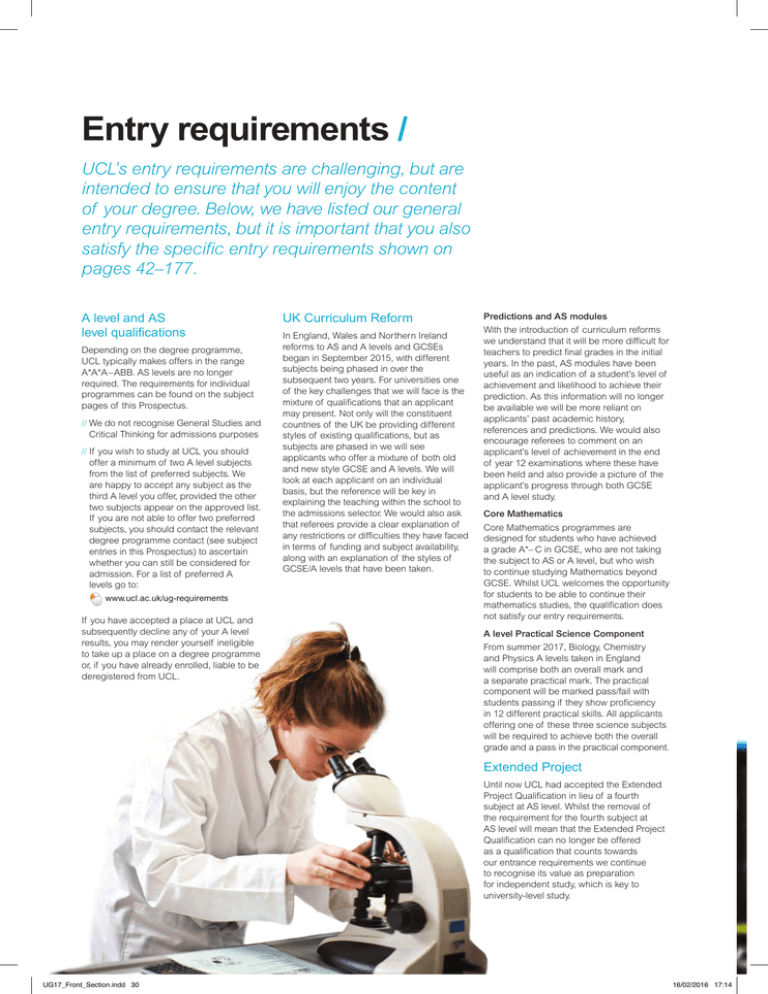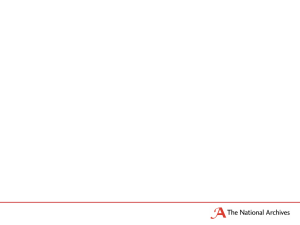Entry requirements /
advertisement

Entry requirements / UCL’s entry requirements are challenging, but are intended to ensure that you will enjoy the content of your degree. Below, we have listed our general entry requirements, but it is important that you also satisfy the specific entry requirements shown on pages 42–177. A level and AS level qualifications Depending on the degree programme, UCL typically makes offers in the range A*A*A–ABB. AS levels are no longer required. The requirements for individual programmes can be found on the subject pages of this Prospectus. // We do not recognise General Studies and Critical Thinking for admissions purposes // If you wish to study at UCL you should offer a minimum of two A level subjects from the list of preferred subjects. We are happy to accept any subject as the third A level you offer, provided the other two subjects appear on the approved list. If you are not able to offer two preferred subjects, you should contact the relevant degree programme contact (see subject entries in this Prospectus) to ascertain whether you can still be considered for admission. For a list of preferred A levels go to: w ww.ucl.ac.uk/ug-requirements If you have accepted a place at UCL and subsequently decline any of your A level results, you may render yourself ineligible to take up a place on a degree programme or, if you have already enrolled, liable to be deregistered from UCL. UK Curriculum Reform In England, Wales and Northern Ireland reforms to AS and A levels and GCSEs began in September 2015, with different subjects being phased in over the subsequent two years. For universities one of the key challenges that we will face is the mixture of qualifications that an applicant may present. Not only will the constituent countries of the UK be providing different styles of existing qualifications, but as subjects are phased in we will see applicants who offer a mixture of both old and new style GCSE and A levels. We will look at each applicant on an individual basis, but the reference will be key in explaining the teaching within the school to the admissions selector. We would also ask that referees provide a clear explanation of any restrictions or difficulties they have faced in terms of funding and subject availability, along with an explanation of the styles of GCSE/A levels that have been taken. Predictions and AS modules With the introduction of curriculum reforms we understand that it will be more difficult for teachers to predict final grades in the initial years. In the past, AS modules have been useful as an indication of a student’s level of achievement and likelihood to achieve their prediction. As this information will no longer be available we will be more reliant on applicants’ past academic history, references and predictions. We would also encourage referees to comment on an applicant’s level of achievement in the end of year 12 examinations where these have been held and also provide a picture of the applicant’s progress through both GCSE and A level study. Core Mathematics Core Mathematics programmes are designed for students who have achieved a grade A*– C in GCSE, who are not taking the subject to AS or A level, but who wish to continue studying Mathematics beyond GCSE. Whilst UCL welcomes the opportunity for students to be able to continue their mathematics studies, the qualification does not satisfy our entry requirements. A level Practical Science Component From summer 2017, Biology, Chemistry and Physics A levels taken in England will comprise both an overall mark and a separate practical mark. The practical component will be marked pass/fail with students passing if they show proficiency in 12 different practical skills. All applicants offering one of these three science subjects will be required to achieve both the overall grade and a pass in the practical component. Extended Project Until now UCL had accepted the Extended Project Qualification in lieu of a fourth subject at AS level. Whilst the removal of the requirement for the fourth subject at AS level will mean that the Extended Project Qualification can no longer be offered as a qualification that counts towards our entrance requirements we continue to recognise its value as preparation for independent study, which is key to university-level study. UG17_Front_Section.indd 30 16/02/2016 17:14 31 International Baccalaureate (IB) Other qualifications The normal requirement for admission to UCL is the award of the Diploma achieved with good grades across individual subjects. The standard minimum requirement is 34 points overall, with a combined score of 16 achieved in three higher level subjects with no grade lower than 5. However, many of our programmes have higher entry requirements than this. You will find the requirements for individual programmes on the subject pages of this Prospectus. We accept a number of other UK and overseas qualifications. Comparing International Baccalaureate to A levels Our programmes may specify up to two individual higher level grade requirements. Where this is the case, a higher level grade of 6 is specified as the equivalent of an A grade requirement at A level, and a higher level grade of 7 is specified as the equivalent of an A* grade requirement at A level. For example, a programme that requires grades AAB at A level including grade A in Chemistry has an IB Diploma requirement of 36 points with a score of 17 in three higher level subjects including grade 6 in Chemistry, with no score lower than 5. UG17_Front_Section.indd 31 www.ucl.ac.uk/otherquals GCSE and equivalent qualifications All programmes require GCSE or equivalent passes in English Language and Mathematics at grade C or higher. Some programmes require grades higher than C or additional GCSE passes in specific subjects, as outlined in the subject entries in this Prospectus. For the new GCSE which will be given a numerical grade between 1 and 9, UCL will consider 8 to be equivalent to A*, 7 to A, 6 to B and 5 to C. UCL encourages intercultural awareness in all its students, and considers experience of learning a foreign language a vital element of a broad and balanced education. UCL wishes to ensure that all of our graduates have had some experience of exploring another culture through language – but we are concerned to ensure that our admissions requirements do not disadvantage those who did not undertake language study to GCSE or above at school. UK students who do not have a GCSE grade C or equivalent in a foreign language (other than Ancient Greek, Biblical Hebrew or Latin) on admission to UCL will be required to acquire an equivalent level of language proficiency once they are enrolled with us. This will either be through study for a specially designed certificate at the UCL Centre for Languages & International Education, or by taking a 0.5 CU (course-unit) module in a language as part of their degree programme. Applications from ‘fast track’ students Some schools, both in the UK and overseas, fast track their students and limit the number of examinations they take. As a result, you may not be sitting some GCSE or equivalent qualifications. We will be pleased to consider your application on its individual merits. 22/02/2016 16:59 We may issue conditional offers based on future examination performance; unless otherwise stated, any conditions for these must be fulfilled by 31 August 2017 English language requirement If your first language is not English you must be able to provide recent evidence that your spoken and written command of the English language is adequate for the programmes for which you have applied. The requirements for most programmes will be at one of three levels: Standard, Good, or Advanced (see pages 32–33) and the evidence we require may take one of the following forms: // substantial education (minimum 12 months) or work experience (minimum 18 months) conducted in English, in a majority English speaking country and undertaken no more than two years prior to your proposed date of enrolment // an acceptable English language qualification or test result (see pages 32–33), which must have been awarded no more than two years prior to your proposed date of enrolment. We reserve the right, in individual circumstances, to specify an additional language requirement for an applicant if it is felt to be necessary, or to require a higher level than that indicated in the table. UG17_Front_Section.indd 32 English language proficiency requirements by programme Bachelor of Arts and Sciences Advanced level required for all programmes Faculty of Arts & Humanities Standard level required for: W100Fine Art BA W101Fine Art BFA Advanced level required for all other programmes Faculty of Engineering Sciences Advanced level required for: N990 Management Science MSci N991 Management Science BSc Good level required for: PN11 Information Management for Business MSci P1N1 Information Management for Business BSc L311 Security and Crime Science BSc Standard level required for all other programmes Faculty of Laws Advanced level required for all programmes Faculty of Brain Sciences Good level required (Advanced for GCSE/ IGCSE) for all programmes Faculty of the Built Environment Standard level required for all programmes Institute of Education Good level required for: X300 Education Studies BA C801 Psychology with Education BA/BSc L300 Social Sciences BSc LG33Social Sciences with Quantitative Methods BSc Faculty of Life Sciences Good level required for all programmes Faculty of Mathematical & Physical Sciences Good level required for: LG13 Economics and Statistics BSc (Econ) V550 History and Philosophy of Science BSc L391 Science and Society BSc Standard level required for all other programmes For all other programmes please contact UCL Admissions (undergraduate-admissions@ucl.ac.uk) 16/02/2016 17:14 33 Faculty of Medical Sciences Advanced level required for: A100 Medicine MBBS BSc Good level required for all other programmes Faculty of Population Health Sciences Good level required (Advanced for GCSE / IGCSE) for all programmes School of Slavonic & East European Studies Good level required for: L1R7 Economics and Business with East European Studies BA L7RREconomics and Business with East European Studies with a Year Abroad BA LR27 Politics and East European Studies BA LRF7 Politics and East European Studies with a Year Abroad BA 4P47 History, Politics and Economics BA Advanced level required for all other programmes Faculty of Social & Historical Sciences Advanced level required for: V110 Ancient History BA V100 History BA V1R9 History with a European Language BA V104 History with a Year Abroad BA 4V86 Philosophy, Politics and Economics BSc Acceptable English language qualifications GCSE/IGCSE English Language Standard level: pass at grade C Good level: pass at grade C Advanced level: pass at grade B British Council International Language Testing System (IELTS Academic Version) Standard level: overall grade of 6.5 with a minimum of 6.0 in each of the subtests Good level: overall grade of 7.0 with a minimum of 6.5 in each of the subtests Advanced level: overall grade of 7.5 with a minimum of 6.5 in each of the subtests Test of English as a Foreign Language (TOEFL) Standard level: Score of 92 overall with 24/30 in reading and writing and 20/30 in speaking and listening Good level: Score of 100 overall with 24/30 in reading and writing and 20/30 in speaking and listening Advanced level: Score of 109 overall 24/30 in reading and writing and 20/30 in speaking and listening Our preferred English language qualifications are GCSE English Language and IELTS, though we accept a number of different English language qualifications. www.ucl.ac.uk/ug-english-requirement The UCL Centre for Languages & International Education offers you a range of approved English language courses. www.ucl.ac.uk/clie clie@ucl.ac.uk +44 (0)20 7679 5454 Good level required for all other programmes UG17_Front_Section.indd 33 16/02/2016 17:14







